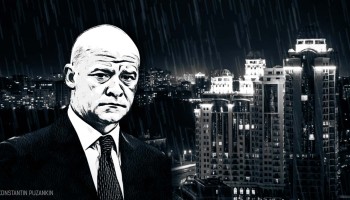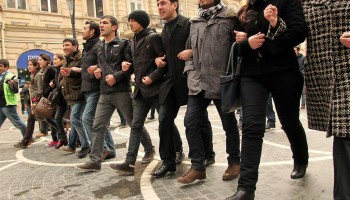Lebanese authorities had promised that their investigation into the explosion, which also injured 7,500 people and left over 250,000 homeless, would take five days.
Six months later, those efforts have severely stalled amid a series of serious due process violations and several bids at obstruction from political leaders, HRW said.
The NGO urged French President Emmanuel Macron to seek global support for the appointment of an independent team of international investigators. Macron proposed the idea after a brief visit to Beirut on August 6, but it was rejected by Lebanese President Michel Aoun.
“We are calling on President Macron to lead in bringing together other states to demand an international, independent investigation,” Lama Fakih, Human Rights Watch’s Crisis and Conflict director and head of the organization’s Beirut office, told OCCRP.
“A long history of abuses shows us what we can expect from a domestic investigation into the blast – impunity,” she explained, referring to evidence of political inference and a lack of resolve among authorities. ”There was a need for an international investigation [in August], and there is [still] a need for it now.”
In the weeks after the blast, OCCRP published an investigation revealing a number of unanswered questions surrounding figures with connections to the shipment of ammonium nitrate that spontaneously detonated in the heart of the Lebanese capital.
Of the 37 people charged in connection with the blast by investigating judge Fadi Sawan, 25 have been detained under conditions that appear to violate their due process rights, HRW added in its statement.
Most detainees are customs, port and security officials, who are being held on ambiguous charges and stand accused of the same crimes despite their differing roles and responsibilities.
Sawan’s ability to effectively investigate has also been questioned, with political figures accusing the judge of “violating the constitution by bypassing parliament” after he charged Hassan Diab, the country’s caretaker prime minister, and three former ministers with negligence.
Diab, along with two of the three ministers, failed to show up in court, while Minister of Interior Mohammed Fahmi said he would not order their arrest even if warrants were issued.
Days after the explosion, victims’ families called on the U.N. Security Council to launch an international probe.
Just one month later, Amnesty International said in a statement that “it is increasingly clear that the processes the Lebanese authorities have set up to look into the tragic events of August 4 are neither independent nor impartial.”
“[Amnesty] is therefore reiterating its call for an international fact-finding mechanism to guarantee victims rights to truth, justice and remedy,” the watchdog added.






